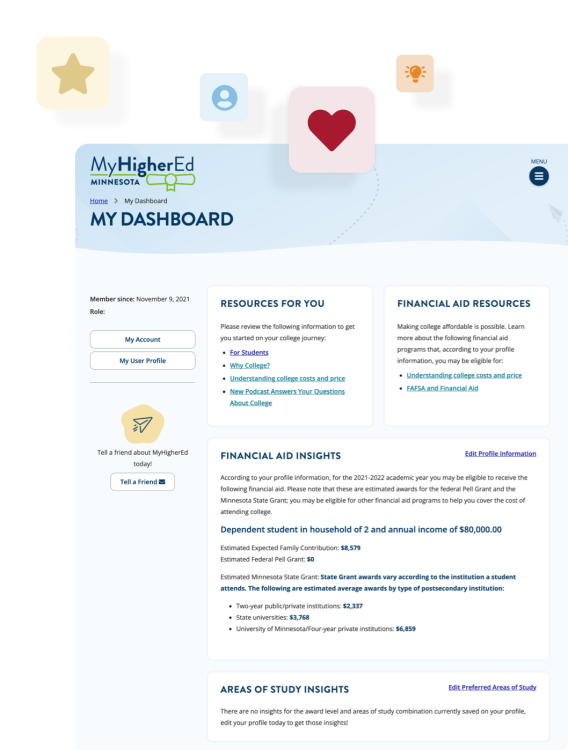Regardless of what you plan on doing in the future, remember that a good education prepares you for any job. Employers are looking for employees who speak and write clearly, solve problems, and can work well with others. Throughout higher education you will learn these skills.
Start Early
Colleges use specific admissions process that includes deadlines and due dates for certain materials. Being prepared for the admission process is important for ultimately getting accepted to your college of choice.
Some institutions have selective program admissions with specific criteria and requirements that applicants must meet in order to be accepted into their programs. As a rule of thumb, and to keep your college options broad, one of the most important things you can do to prepare for college is getting the best grades you can and keeping your grade point average (GPA) high.
Tips to help you earn your best grades throughout school
- Listen and ask questions. Engaging in class not only will help you learn the content and do well in class, it will help you figure out what topics and courses you’re most interested in.
- Seek out a mentor. Find somebody who went to college and ask them for support or advice. A mentor can be almost anyone: a family member, a person in your neighborhood, a teacher at school or a person who leads an afterschool program.
- Study. Read, review and analyze class material so you know it. This takes time, effort and a quiet place. If you learn how to study now, you'll be way ahead before you even start college.
- Read. You can read whatever you want! Reading increases your brainpower.
- Write. Writing is a way to express yourself — your ideas, opinions and knowledge. And you may do a lot of it in college and on the job. Edit someone else's writing and let that person edit yours.
- Do the math. Even if you're struggling in math, stay with it. It opens doors to good jobs and almost every job uses some kind of math.
Be Proactive About Your Education
Read our monthly MyHigherEd newsletter with the latest financial aid tips and related news sent directly to your inbox.
College Prep Timeline
In 7th & 8th Grade
- Focus on your academics. This time is important to solidify good study habits including setting and reaching goals, and practicing good homework and test skills.
- Talk to your parents, teachers, and counselors about college. Where did they go to college? Did they like college? This will help you figure out what you might want to do after high school. Simply talking about college can go a long way to help you see you’re self there.
- Start the conversation with your parents about saving and paying for college. If your parents are looking for some information about saving for college they can learn more about MN Saves which is a college savings plan.
In 9th & 10th Grade
- Start thinking about your career interests and skills. Check out this Career and Education Explorer tool to help you. What you're interested in and what a potential career might be will help you figure out what type of education you'll need. Talk with school counselors, teachers, friends, and parents about career ideas. And continuing talking with these people about college and college options.
- Earn college credits while in high school. Most Minnesota high schools offer students the opportunity to earn college credits by taking a college-level course (dual credit) or by taking a college-level exam (exam-based credit). These programs will allow you to experience what it's like to take a college class and can set you up for success once you enroll in college. Check with your school which of the following dual credit and exam-based credit programs they offer:
- Concurrent Enrollment allows high school students to take college-level courses at their high school through partnerships between high schools and colleges. Students earn both high school and college credit by passing the class. In addition "concurrent enrollment," these programs are sometimes called College in the Schools, CEP, or College Now.
- Postsecondary Enrollment Options (PSEO) is a program that allows Minnesota high school juniors and seniors to enroll in college courses on campus or online. Students earn both high school and college credit by passing the class. Sophomores can also participate in PSEO if they first take and pass one CTE course.
- Career and Technical Education (CTE) allows public school sophomores, juniors and seniors to take career-focused college courses while in high school. These courses are often hands-on and provide training for in-demand jobs.
- International Baccalaureate (IB) is a two-year pre-college diploma program that helps prepare students age 16 to 19 for higher education in the United States and overseas through a combination of course-taking and test-taking. Students have the opportunity to earn college credit by receiving a passing score on the IB subject exam, as determined by the college.
- Advanced Placement (AP) allows high school students to take college-level courses at their high school with the potential to earn college credit by receiving a passing score on the AP subject exam, as determined by the college.
- College Level Examination Program (CLEP) allows students to earn college credit by taking exams for what they already know. Students can submit their scores to a college or university and receive college credit based on their scores, if the college accepts CLEP scores. There are no classes that students take to help them prepare for these exams; students register and take tests independently.
- Explore your interests through extracurricular activities. Look into clubs, sports, internships, and volunteer opportunities. This will help you define yourself and your interests and it’ll also help show colleges who you are.
In 11th Grade
- Continue to explore your career options and interests. In eleventh grade is when college preparation really gets ramped up. Beyond career exploration, you should continue participating in extracurricular activities, including getting a job to help you have job experience in a particular sector and save some money for college.
- Keep planning your high school classes to maintain your grades and GPA up. This might include taking dual credit classes.
- Consider taking practice SAT and ACT tests in the fall and sign up for the SAT and ACT in the spring. Some colleges use these tests to evaluate your college readiness. And although more colleges are making these tests optional, taking them and getting a high score can be helpful when applying to college.
- Continue the conversation with your parents about paying for college. Start looking for grants and scholarships, and other financial aid options. There are organizations all over the state that provide private scholarships; these can make a real difference when it comes to pay for college.
- Start searching for and looking into different colleges. It’s important for you to see what all is out there. You can use MyHigherEd's college search tool to explore and compare Minnesota institutions.
In 12th Grade
- Start visiting the colleges of your interest. Your final year in high school is one of the most important for your college search. The summer before senior year, you should visit some colleges that you’re interested in. Visit the colleges close to you in person and for the colleges to far to get to — you can visit them virtual and talk with admissions counselors. The most important thing is to reach out to colleges; they want to hear from you.
- In the fall, select the colleges you want to apply to. Make a list of colleges and their deadlines, making sure you have a wide range of different types of colleges. Start working with admissions counselors at each college, they’ll help you figure out things like how much it might cost, what you need to do to get accepted, and they’ll help you keep up with deadlines.
- Apply, Apply, Apply! Colleges have different deadlines, some of these are in the fall semester and some are in the spring. Your goal should be to get your applications in.




